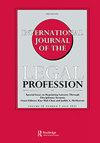Legal aid and clients with multiple problems: a first screening at the Dutch Legal Services Counter
IF 0.9
Q2 LAW
International Journal of the Legal Profession
Pub Date : 2022-05-19
DOI:10.1080/09695958.2022.2074424
引用次数: 0
Abstract
ABSTRACT Introduction The Legal Services counters (LSC) is the first contact point for legal aid in the Netherlands. Professionals reported dealing with a client group combining problems on several dimensions, next to the legal issue. This combination (multiple problem situation, MP) seems to impair the effectiveness of the provided legal help. Methods A face-to-face survey among 421 visitors of 4 LSC locations was administered (2019). Analyses Statistical techniques were used to assess the occurrence of MP, the association with the numbers of contacts with the LSC, the background characteristics of clients with and without MP, and the multivariate association between stress, MP and use of the LSC. Results 44,1% of the respondents reported MP. Those reported a higher number of contacts with the LSC in the past year. MP clients were older and had a lower education level. Financial (58%), conflictual (56%) and physical health (41%) problems were mostly reported. Stress and number of problems were related to a higher attendance to the LSC. Discussion Legal aid services should set out systematic collaboration paths with other social services, starting off by an assessment of the problem domains, to contribute to an effective solution of those issues, including the legal one.法律援助和有多重问题的客户:荷兰法律服务柜台的第一次筛选
摘要简介法律服务柜台是荷兰法律援助的第一个联络点。专业人士报告称,与一个客户群体打交道时,除了法律问题外,还涉及几个方面的问题。这种组合(多问题情况,MP)似乎削弱了所提供法律帮助的有效性。方法对4个LSC地点的421名来访者进行面对面调查(2019年)。分析使用统计技术评估MP的发生率、与LSC接触次数的相关性、患有和不患有MP的客户的背景特征,以及压力、MP和LSC使用之间的多变量相关性。结果44.1%的受访者报告了MP。那些报告在过去一年中与LSC接触的人数更多。MP客户年龄较大,受教育程度较低。财务(58%)、冲突(56%)和身体健康(41%)问题主要被报告。压力和问题数量与LSC的出勤率较高有关。讨论法律援助服务应与其他社会服务机构制定系统的合作路径,首先对问题领域进行评估,以帮助有效解决这些问题,包括法律问题。
本文章由计算机程序翻译,如有差异,请以英文原文为准。
求助全文
约1分钟内获得全文
求助全文

 求助内容:
求助内容: 应助结果提醒方式:
应助结果提醒方式:


